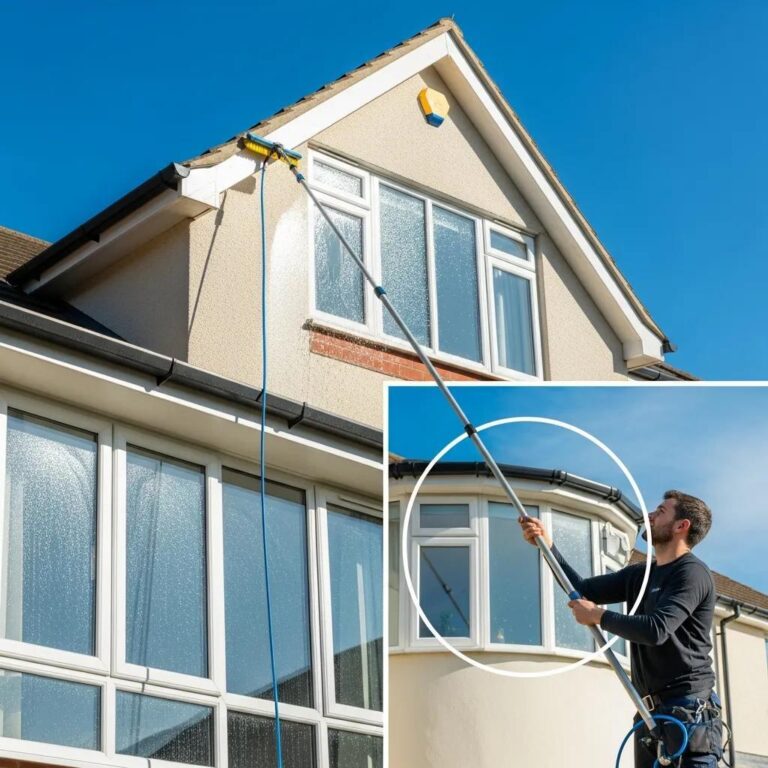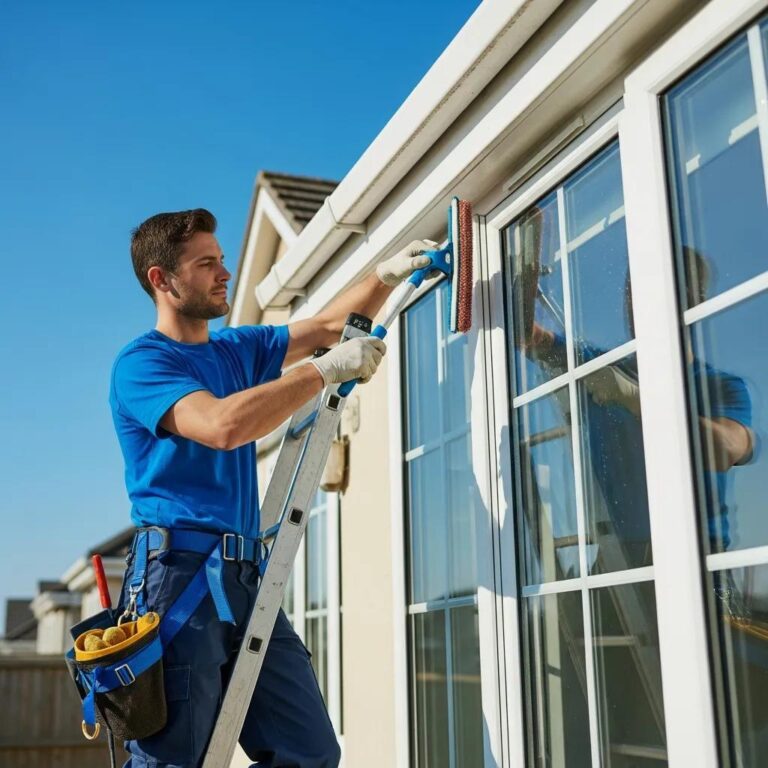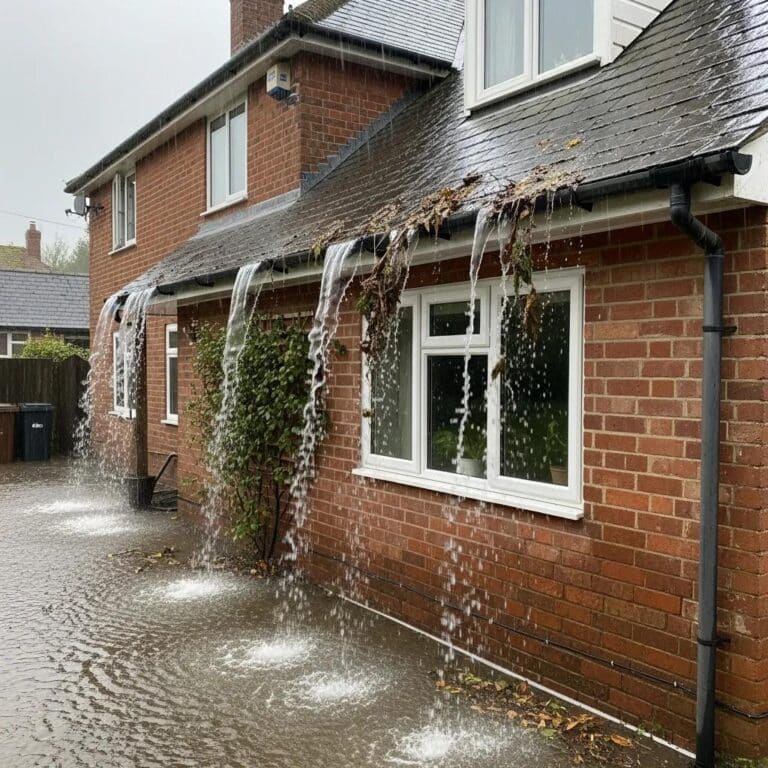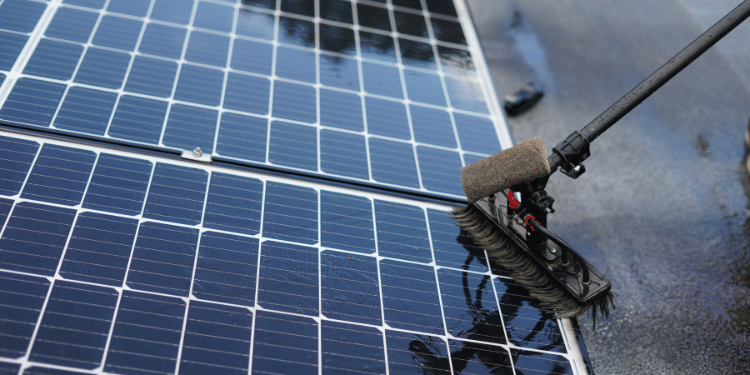Imagine heavy rain falling. Now picture what happens if your gutters are clogged with leaves, dirt, and debris. Water overflows, your roof leaks, and your garden gets muddy.
Not good, right?
Gutters might seem like a small detail in home maintenance, but they play a huge role in protecting your home from water damage. Keeping them clean ensures water flows away from your house, not into your walls or foundation.
We’ll explain the DIY (Do it Yourself) and professional ways of cleaning your gutters in this post. We’ll also discuss how often gutters should be cleaned, among other useful information that will help you decide which is better for you between DIY and hiring a professional to clean your gutters.
Let’s get right into it in detail, starting with the importance of cleaning your gutters.
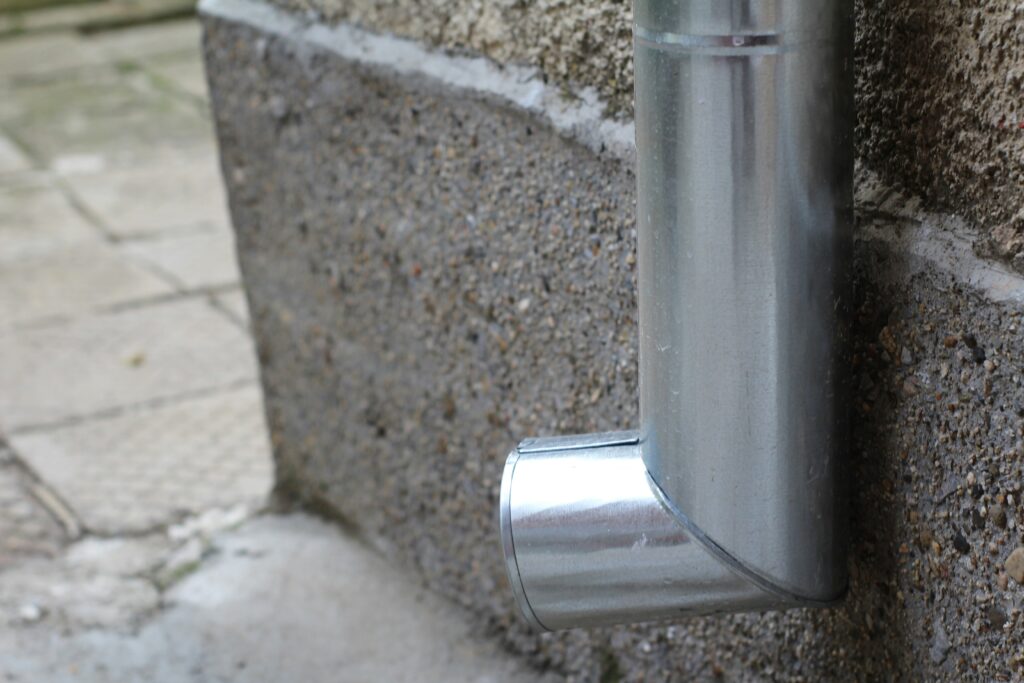
Why is Gutter Cleaning Essential?
Before we compare DIY vs professional, let’s make sure we understand why gutter cleaning is so important.
If you skip it, your home can suffer.
1. Prevent water damage to your roof and walls: When water can’t flow off the roof properly because gutters are blocked, it can back up under roof materials and cause leaks, rot, or mold growth.
2. Protect your foundation: If gutters overflow, water can pool around the base of your house. Over time, this can erode soil, damage your foundation, or cause basement flooding.
3. Maintain curb appeal: Overflowing gutters, stains, and visible damage can make your home look neglected. A well-kept gutter system helps your home look cared for.
4. Prevent pests and insects: Stagnant water in clogged gutters is attractive to mosquitoes. Leaves and debris give hiding places for rodents, birds, or insects.
5. Extend the lifespan of gutters and roof: Debris, stagnant water, and blockages put extra stress on gutters, causing sagging, corrosion, seams breaking, etc. A clean system lasts longer.
So cleaning gutters is a functional, preventive measure.
Now, let’s see how you might go about it yourself, and when you might need a professional.
DIY Gutter Cleaning
Cleaning your own gutters can be rewarding and cost-saving, but it also has risks and drawbacks.
Below are the advantages and disadvantages of doing it yourself.
Pros of DIY Gutter Cleaning
1. Cost savings: You don’t pay labor charges. The main costs are tools, safety gear, and your time. For many people, this is a strong motivator.
2. Flexible schedule: You can decide when to do it; a dry weekend, after a storm, or when you notice gutters are blocked. You don’t have to wait for a contractor.
3. Immediate action: If you see a clog, you can jump on it right away rather than calling someone and waiting for their availability.
4. Familiarity with your system: Doing it yourself means you get close-up inspection of gutters, seams, downspouts, and can spot small problems early (cracks, loose brackets, rust).
5. Sense of accomplishment: Many homeowners like the satisfaction of doing maintenance themselves.
Cons of DIY Gutter Cleaning
1. Safety risks: Climbing ladders, working at heights, and handling debris; these all carry the risk of falls, slips, or injury. Many DIY accidents come from ladder misuse.
2. Time-consuming: What seems like a quick job often takes several hours, especially for larger homes or clogged gutters.
3. Lack of proper tools or technique: Professionals use telescoping tools, specialized vacuums, pressure-washers, or other gear you likely don’t own. Without them, you might miss debris or be less thorough.
4. Potential for damage: Overreaching, putting ladder feet in soft ground, or using too much pressure can deform gutters or damage roofing.
5. Inconsistency: You might do a rushed job, miss parts, or skip inspection. Over time, small problems may grow unnoticed.
6. Not always practical: If your house is more than one story, if the roof pitch is steep, or if there’s difficult access, DIY can become risky or impractical.
Ask yourself these questions:
- Are you comfortable with heights and ladders?
- Do you have extra time on weekends or suitable days to do the job safely?
- Do you own or can you borrow good-quality tools (ladder, gloves, gutter scoop, hose, etc.)?
- Is your house a single-story or easy to access from the ground?
If your answers lean “no” in many cases, DIY may not be the best choice. On the other hand, if you love home projects, have time, and your gutter system is accessible, DIY can work well.
Professional Gutter Cleaning
Hiring a pro is the alternative. Here are the advantages and disadvantages of paying someone to do it.
Pros of Professional Gutter Cleaning
1. Safety and risk reduction: Professionals are trained to work safely at heights, use ladders correctly, and often carry liability insurance. You avoid personal injury risk.
2. Efficiency and speed: With experience and good tools, professionals can finish the job faster and more thoroughly than most DIY attempts.
3. Expert inspection and detection: They can spot hidden problems (loose fasteners, leaks, corrosion, incorrect slope) and recommend repairs.
4. Proper equipment: Professionals use tools like gutter vacuums, high-pressure flushing, telescopic wands, etc., enabling more complete cleaning of hard-to-reach spots.
5. Convenience: You don’t have to lift a finger (aside from booking). You save time and energy.
6. Liability & insurance protection: If a worker is injured or property is damaged, you are often protected (depending on the company and contract).
7. Better long‑term results: A professional job tends to last longer before the next clog, because debris is more thoroughly cleared. Also, preventive issues get addressed early, which may save money in the long run.
Cons of Professional Gutter Cleaning
1. Cost: You pay for labor, transport, overheads, and profit margin in addition to the work. For simple gutters, DIY might be much cheaper.
2. Scheduling constraints: Professionals may be booked up, especially during peak seasons (fall, after storms). You may have to wait for an opening.
3. Variable service quality: Not all companies are equally good. Some may rush jobs, miss spots, damage gutters, or do shoddy cleanup. Choosing a reputable company is important.
4. Recurring cost: Since regular cleaning is required, professional service becomes a recurring expense. Over the years, this adds up.
5. Access or terrain limitations: If your house is in a tight spot, surrounded by trees or landscaping, contractors may charge extra or not reach all parts easily.
6. Less hands‑on familiarity: You don’t personally see the nooks and cracks; you depend on the contractor’s reports and assessments.
Ask yourself these questions:
- How much value do you place on your time vs. money?
- Are you comfortable vetting and hiring contractors (checking quotes, reviews, insurance)?
- Is your house difficult to reach or large?
- Are you okay with paying a regular service fee in exchange for peace of mind?
If safety, speed, and reliable maintenance are priorities, professional service may make a lot of sense to you especially if you have a bigger or more complex home.
How Often Should Gutters Be Cleaned?
Regardless of who does the cleaning, frequency matters. Clean too rarely, and blockages will cause damage. Clean too often, and you’re spending unnecessary time or cost.
It is typically recommended to clean your gutters twice a year in spring and autumn. Spring cleaning clears debris left from winter storms, snow, or ice. Autumn cleaning handles falling leaves before winter.
Some conditions call for more frequent cleaning:
- You live in or near heavy tree cover; leaves, pine needles, seeds, and debris fall constantly.
- You experience frequent storms or high winds that produce extra debris.
- You have steep roofs, complex gutter systems, many joints, or multiple downspouts, which may clog more easily.
- You live in a climate with long rainy or stormy seasons.
In such cases, 3 or even 4 times a year might be necessary.
Also, you don’t always have to wait for a calendar schedule. Be alert to these signs that gutters need attention:
- Water is overflowing the top edges of gutters.
- Overflow near corners or where the gutter joins the downspout.
- Plants, moss, or algae growing in gutters.
- Sagging or drooping gutters.
- Water marks or stains on your siding or walls.
- Downspouts that are slow or blocked.
- Cracks, seams, or separation in gutters.
When you spot any of these, it’s a good time to inspect or clean.
Conclusion: Professional and Affordable Gutter Cleaning in Kent
If your house is low, easy to access, and you feel confident and safe, DIY can save money and give you direct control. But for taller homes, steep roofs, or if you simply prefer not to risk injury, hiring a pro is often safer, faster, and more reliable.
No matter which one you choose, remember that gutter cleaning is essential. Neglecting it can lead to leaks, foundation damage, rotten wood, pest infestations, and costly repairs.
If you’re in Kent and looking for a reliable gutter cleaning service Kent to take care of your gutters, look no further than ClearView Services, with a great reputation and a commitment to customer satisfaction.
Don’t wait for a rainy day disaster to remind you about your gutters. Contact ClearView Services now!

